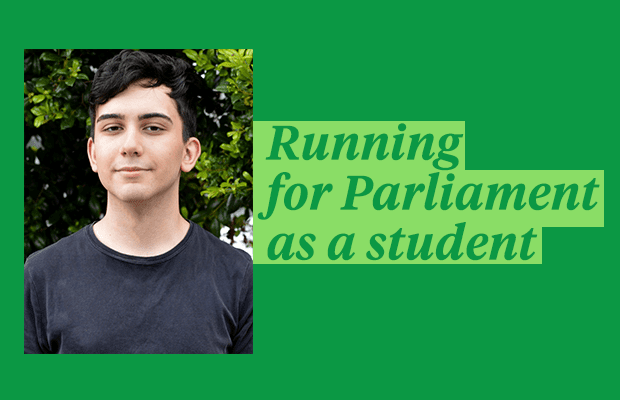National legislatures and young people are two things that are not commonly associated. The average age of Australian Federal Members of Parliament has hovered around 50 since federation, and at last count was 51. In the United States, citizens under the age of 25 are constitutionally disallowed from sitting in the House of Representatives. Throughout Western democracies, politicians are almost universally characterised as older than the general populace.
It’s precisely this criterion for candidacy that young candidates around the country are poised to question this Federal Election. Almost 120 candidates under the age of 35 have nominated to enter the 46th Parliament, including 38 students. The Greens have put up the most number of student candidates, with 15, at least two of which attend the University of Sydney.
“People are labelling me as a ridiculously young candidate,” Greens candidate for Barton and USyd student Connor Parissis told Honi. Parissis is currently studying a Master of Publishing after finishing his undergraduate degree last year, and has been heavily involved with student politics during his time on campus.
“I’ve been asked at polling booths whether I’m actually legally allowed to vote. People just look at me and say, ‘holy crap, you’re really young’,” he goes on to say.
“That’s been the main thing — challenging the idea of who can run for Parliament. Does it have to be this old man in a suit and tie with grey hair and a receding hairline, or can it be someone young?”
The influx of young candidates comes at a time of record youth enrolment — over 4 million voters under the age of 35 are enrolled to vote in the 2019 Federal Election, a number that pundits have speculated was assisted by the enrolment push in the 2017 Marriage Equality Plebiscite.
Most of these student candidates hold a very small chance of winning their electorate. According to Parissis however, candidates like him are there mainly to send a message.
“A lot of people are really into this anti-establishment idea, particularly a lot of swing voters.
When they see a young candidate, they say ‘yeah, let’s get behind this new way of thinking about politics’,” Parissis explains.
“In the same vein, the Liberals and the right are then using that same argument to dismiss me entirely. I can’t have an opinion because I’m too young, or I can’t engage in political commentary because I don’t have the lived experience.”
Two weeks before the election, Parissis was caught up in the flurry of media stories that exposed a variety of candidates’ old social media posts.
The Daily Telegraph reported that Parissis had shared a number of controversial posts, including memes that News Corp dubbed anti-Semitic. The images labeled the Israeli Defence Force “terrorist” and Israel as “occupied Palestine”.
Parissis apologised for posts encouraging violence against police and retained the endorsement of his party, arguing that the smear campaign had failed and that candidates “saw through the bullshit”.
When asked about his goals, Parissis is blunt.
“We’re not expecting to win, obviously. I’m not expecting to beat Linda Burney anytime soon,” he explains, referring to the Labor incumbent.
But Parissis doesn’t think that’s any reason not to run.
“It’s the biggest platform you’re going to get. People like me — young people and uni students — who want to step up and have that platform should do it.”





